Houston Climate Showcase
Learn about other climate showcase communities.
Houston, Texas
Federal Funding: $423,069
Project Timeline: July 2010 – September 2013
- Project Summary
- Community Characteristics
- Results
- Lessons Learned
- Sustainability/ Replication
- Photos
Houston's petrochemical refining industry and port operations have a significant impact on area air quality and greenhouse gas emissions (GHG). Local vehicle travel adds to these environmental challenges. As part of its efforts to address GHG emissions and air pollutants, the City of Houston launched three Climate Showcase initiatives:
- A plug-in hybrid electric vehicle (PHEV) conversion,
- An electric vehicle program, and
- A bike share demonstration program.
First, Houston converted five Priuses into plug-in hybrid electric vehicles (PHEVs). One of the PHEVs was incorporated into the Houston Fleet Share program, which is a ZipCar program for municipal employees. At the end of Q3 2013, the average actual MPG for the converted PHEVs was 36.82 MPG. Second, the project leased two all-electric vehicles (Nissan Leaf) and incorporated EVs into the Houston Fleet Share program. A marketing campaign occurred to promote electric vehicles and educate the public. This campaign also collected data from the charging stations to learn more about how the public is using them. Through a partnership with the Rocky Mountain Institute and Houston’s Geotechnology Research Institute, the City also developed a “Houston EV Readiness Roadmap” to identify and overcome longer-term barriers to adopting electric vehicles.
Third, the City implemented a bike-sharing program called Houston B-cycle, which initially provided 18 bicycles to travelers at three stations in downtown Houston. The number of bikes in the program grew to 220 by the end of Q3 2013. For trips under one half hour, bicyclers can use the bikes for free, after which they are rented on an hourly basis. This initiative was involved in the creation of Houston Bike Share, the non-profit that operates and maintains Houston B-cycle. Houston partnered with local business and developers to install the bike share station in a prominent downtown location. Solar-powered station kiosks will continue to collect data for analysis on usage and trip characteristics. Additionally, grant funding helped to support the development of “Recommendations for a Full-Scale Bike Sharing Program for Houston,” a report which assessed bike sharing programs national wide and focused on recommendations for expanding the initial pilot program.
The three initiatives provide important ongoing environmental benefits: they reduce GHG emissions by promoting alternative forms of transportation, as well as reducing air pollutants such as particulate matter and volatile organic compounds. Efforts to increase bicycle travel also yield health benefits to participants, facilitate accessibility to and within the downtown area, and improve quality of life in local neighborhoods. The City also focused on developing partnerships with local stakeholders to raise community awareness and acceptance of electric vehicles and bicycle transportation. Projects like the Houston Plug-in Roadmap, data collection efforts, and a focus on improving the deployment of electrical vehicles and bike-friendly technologies help to ensure that these benefits continue beyond the life of the program.
Population 2.2 million
Area 600 square miles
Government Type: City
Community Type: Urban
Median household income: $33,000
|
Final Results |
Projected Cumulative Results |
|
|---|---|---|
|
Annual GHG Reductions |
122.4 mt CO2e |
24 mt CO2e |
|
Electric Vehicles Purchased |
5 |
5 |
|
Charging Stations Built |
4 |
4 |
|
Bike Share Stations Built |
3 |
1 |
|
Annual Gasoline Savings |
9,592 gallons |
1,365 gallons |
- It is important to have a dedicated staff person manage new technologies who can also educate others of how to use those technologies.
- It is also important to understand all components of the technology so that outreach efforts can help users understand how to maximize the benefits of the technology.
- It can be helpful to offer training on the technologies, especially for those driving an EV for the first time.
- Houston learned to consolidate resources under one entity or department to ensure maintenance of the vehicles. This helps the responsible entity to track issues, create guidelines for use, and enhance the performance of the vehicles. This lesson also applies to electric vehicle charging stations.
- The Fleet Management Department’s new Public Information Officer (PIO) is overseeing all the City’s EV and EVSE work and will help ensure the sustainability of these programs.
- The sustainability of the bike share program is in part due to Mayoral support, which helped secure additional federal and private funding, as well as the dedication of the Houston Bike Share non-profit board members and staff.
- Funding from the Department of Energy’s EECBG program and the Coca-Cola Foundation have helped with expansion of the program, and the non-profit has received operations and maintenance funding from Blue Cross Blue Shield of Texas through December 2015. The revenue stream generated through ridership helps cover 65% of expenses. Additional funding is being sought after by both Houston Bike Share and the Mayor’s Office of Sustainability for further expansion of the program.
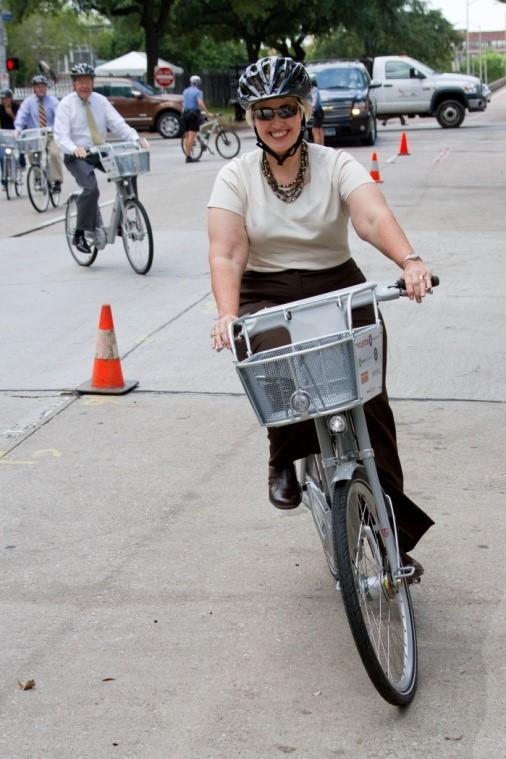 Photos from the Houston B-cycle Kick-off/Press Conference held on May 2, 2012.
Photos from the Houston B-cycle Kick-off/Press Conference held on May 2, 2012.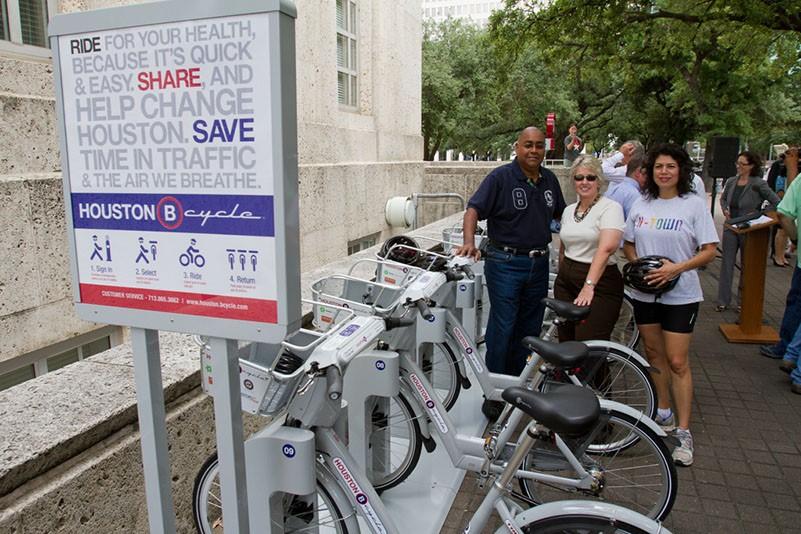 Photos from the Houston B-cycle Kick-off/Press Conference held on May 2, 2012.
Photos from the Houston B-cycle Kick-off/Press Conference held on May 2, 2012.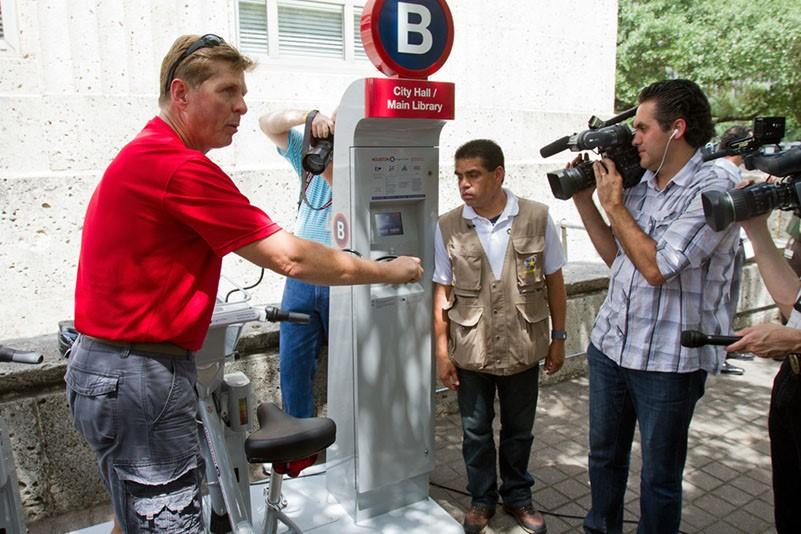 Photos from the Houston B-cycle Kick-off/Press Conference held on May 2, 2012.
Photos from the Houston B-cycle Kick-off/Press Conference held on May 2, 2012.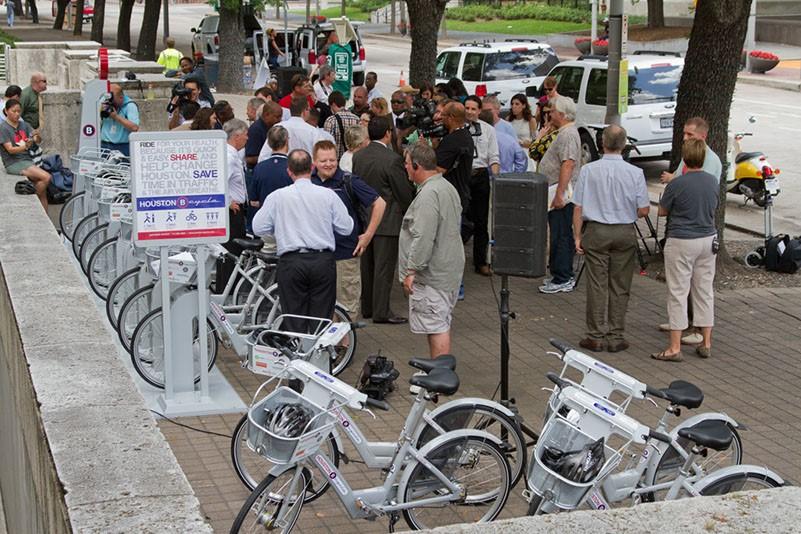 Photos from the Houston B-cycle Kick-off/Press Conference held on May 2, 2012
Photos from the Houston B-cycle Kick-off/Press Conference held on May 2, 2012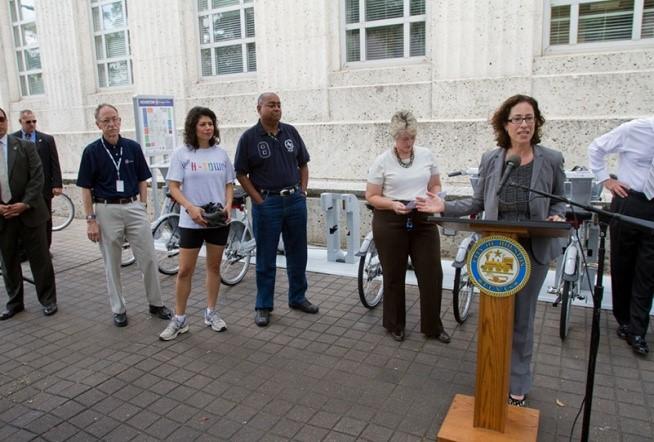 Photos from the Houston B-cycle Kick-off/Press Conference held on May 2, 2012.
Photos from the Houston B-cycle Kick-off/Press Conference held on May 2, 2012.